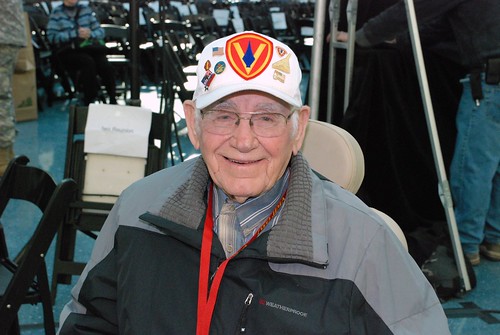John Roy Coltrane from Siler City, North Carolina wishes he had talked about his combat experiences earlier. He didn't start talking about what he had gone through on Midway or on Iwo Jima until he started attending reunions. He says talking about experiences helps the nerves.
Coltrane joined the Marine Corps prior to the start of World War II. He was a 19 year old timberman and decided he could get paid more being in the military so he headed down to the post office where there was a recruiting station, fully intending to join the Army. There, he met the Marine Corps recruiter. He had never heard of the Marine Corps before. Within 5 minutes, the recruiter had talked him into signing a 4-year commitment with the Marine Corps instead of joining the Army which only had a 3-year commitment.
After training, Coltrane arrived at his first duty station on October 4, 1941, Midway Island. Little did he know that in a little over 2 months, the Japanese would launch a surprise attack on Pearl Harbor and Midway would become a contested piece of real estate. An artilaryman, he manned one of the 5-inch coastal guns that protected the island.
In 1943, Coltrane headed back to the states, to Camp Pendleton, where he joined the 5th Marines.
In 1945, 23-year-old Coltrane was a squad leader with an artiliary security platoon. As they road the Higgins boat onto the island, he and only 2 other Marines had prior combat experience. They landed on the beach at 4:30 p.m. on the 19th of February. By this time the Japanese were shooting at the incoming landing craft. As the ramp dropped on his boat, a shell hit directly infront sending fragments into his right elbow. The Corpsman patched him up and sent him on his way. He said it was unfortunate that the Corpsman got killed so no one was able to put the required paperwork in for a purple heart.
Because so many men in the 5th Division had been killed or wounded after 36 days of fighting, they did not head to Okinawa but instead were sent to Australia to re-group. They were at full strength again, just in time for the scheduled invasion of Japan. Luckily, the atomic bombs were dropped as they were enroute. Instead of combat, he spent the next 11 months in Japan as part of the occupation forces. They were tasked with blowing up or destroying Japanese munitions and weapons as well as making shipping crates for all the gear that was being shipped back to the United States.
When he returned to the United States and was discharged, he said he suffered from nightmares for years after. The three dreams he shared with me were: 1) A raid on Midway Island kills everyone except for him and he is left alone on the island, 2) a Japanese zero comes diving at him from the sky, dropping its bombs and he would wake just before the bombs hit the ground; 3) The Japanese steal his metal food tray and water during the night and he catches the soldier and shoots him in the back.
Several other veterans I spoke with shared that they also suffered from nightmares for years following the war. They didn't have a name like PTSD for what they were experiencing and they didn't talk about it. They said they just pushed through it.







No comments:
Post a Comment